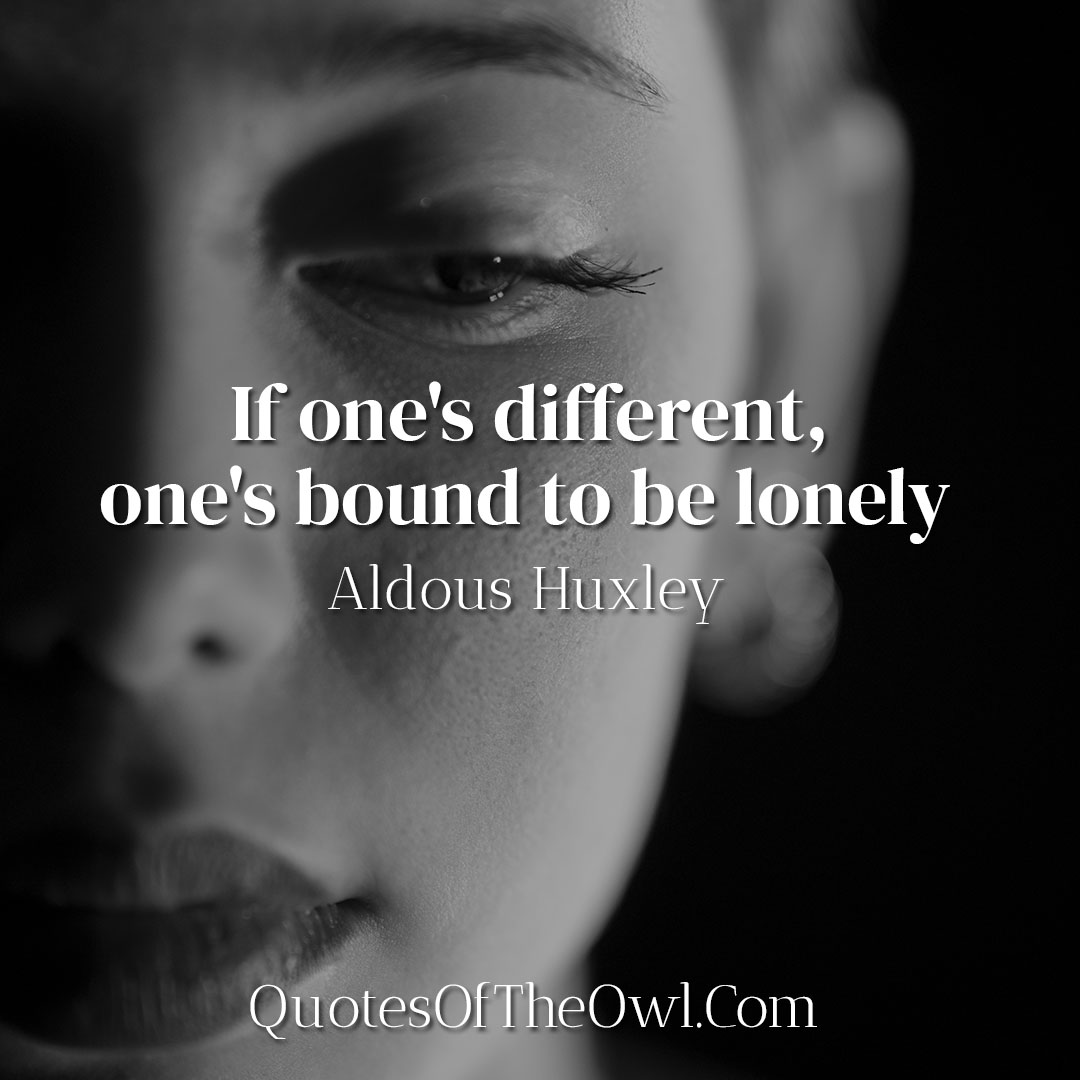If one’s different, one’s bound to be lonely – Aldous Huxley’s Quote Meaning
In this article, we will delve into the profound meaning behind Aldous Huxley’s quote, “If one’s different, one’s bound to be lonely.” With a deep exploration of Huxley’s background and works, we will seek to understand the context in which this quote was uttered. By unpacking the quote, we will analyze the significance of being “different” and the inevitable feeling of “loneliness” that accompanies it. Moreover, we will explore the paradox of loneliness and its relationship with individuality. Throughout the article, we will emphasize the importance of embracing one’s uniqueness and discuss strategies for finding connection and acceptance in a world that often favors conformity.
Understanding the Context
To truly grasp the depth of Huxley’s quote, it is essential to understand the context in which it was spoken. Aldous Huxley, born in 1894, belonged to a time of immense social and cultural change. His works, including the famous novel “Brave New World,” explored themes of individuality, societal conditioning, and the tension between conformity and freedom.
Unpacking the Quote
At first glance, the quote suggests a direct correlation between being different and experiencing loneliness. To fully comprehend its meaning, we must dissect its components. “Different” refers to those individuals who deviate from societal norms, whether in appearance, beliefs, or behavior. “Lonely” signifies a state of isolation and a lack of meaningful connection with others.
In the following sections, we will explore the complexities of this quote, examining the relationship between individuality and loneliness while highlighting the significance of embracing one’s uniqueness.
Embracing Individuality
Society often encourages conformity, placing pressure on individuals to fit into predetermined molds. However, Huxley’s quote challenges this notion by emphasizing the importance of embracing individuality. Being different can be a source of strength and innovation. Throughout history, trailblazers who dared to defy societal expectations have brought about transformative change in various fields.
Individuals like Steve Jobs, who revolutionized the technology industry with his unique vision, or Frida Kahlo, whose distinctive artistic style challenged artistic conventions, serve as prime examples of how embracing one’s uniqueness can lead to extraordinary achievements.
By recognizing and valuing our differences, we can tap into our authentic selves and discover our true potential. Instead of fearing loneliness, we can view it as an opportunity for self-reflection, growth, and the cultivation of our individuality.
Societal Pressures and Conformity
The fear of being different stems from societal pressures and the desire to belong. From an early age, we are taught to conform to societal norms, often sacrificing our authentic selves in the process. However, conformity does not guarantee acceptance or fulfillment. In fact, the relentless pursuit of fitting in can result in a profound sense of disconnection and a loss of personal identity.
Huxley’s quote challenges us to question the status quo and consider the consequences of succumbing to societal pressures. It urges us to break free from the shackles of conformity and embark on a journey of self-discovery, even if it means venturing into the unknown and risking temporary feelings of loneliness.
The Paradox of Loneliness
Loneliness, as Huxley suggests, is not solely determined by external factors such as the number of people around us but by our internal state of being. Even in a crowded room, one can feel profoundly alone if their unique qualities are not acknowledged or accepted. Loneliness, in this context, is not merely a result of physical isolation but a deep emotional and existential longing for genuine connection.
The paradox of loneliness lies in its universality. Despite its inherent pain, loneliness serves as a reminder of our innate need for human connection. It can be a catalyst for introspection, self-discovery, and the pursuit of meaningful relationships. By acknowledging our own feelings of loneliness and extending empathy to others, we can foster authentic connections and create a more compassionate society.
Finding Connection and Acceptance
While embracing individuality may lead to temporary bouts of loneliness, it is essential to remember that true connection and acceptance are possible. By seeking out like-minded individuals and communities that value diversity and uniqueness, we can find solace and understanding.
Moreover, fostering self-acceptance and practicing self-compassion are crucial in navigating the challenges of being different. Embracing our own vulnerabilities and celebrating our strengths can build a foundation of self-worth that transcends external validation. When we accept ourselves fully, we become more capable of forging genuine connections with others.
Embracing Diversity in Society
Huxley’s quote urges society to move beyond its comfort zones and embrace diversity wholeheartedly. In a world that often fears what is unfamiliar, celebrating differences can foster innovation, creativity, and progress. By acknowledging and appreciating the various perspectives, cultures, and identities that exist, we can create a more inclusive and harmonious society.
However, embracing diversity comes with its own set of challenges. Prejudice, discrimination, and societal barriers can hinder the acceptance of those who deviate from the norm. Overcoming these obstacles requires collective effort, empathy, and a commitment to dismantling systemic biases. It is through embracing diversity that we can truly honor the beauty of individuality and cultivate a more compassionate and interconnected world.
Conclusion
Aldous Huxley’s quote, “If one’s different, one’s bound to be lonely,” encapsulates the complexity of the human experience. It reminds us of the inherent tension between individuality and the longing for connection. While being different may lead to temporary feelings of loneliness, embracing our uniqueness can ultimately pave the way for personal growth, self-acceptance, and the discovery of authentic connections.
In a society that often favors conformity, Huxley’s words urge us to challenge the status quo and celebrate diversity. By cultivating acceptance, fostering empathy, and embracing our own individuality, we can create a world that cherishes and nurtures the vibrant tapestry of humanity.
Explore the wisdom of Aldous Huxley through his thought-provoking quotes

